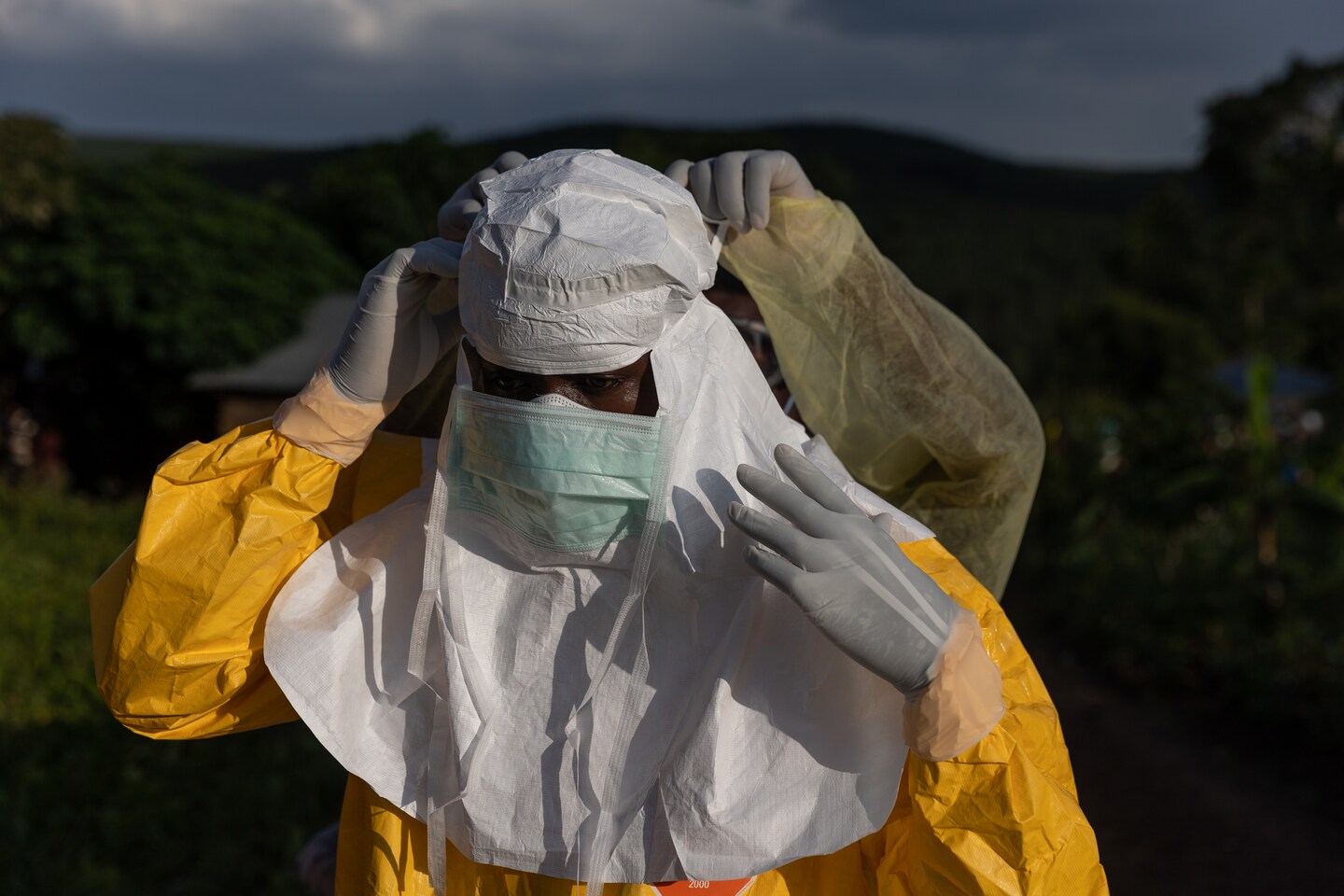Fighting Ebola outbreak with lessons from the covid pandemic

Ebola is a fundamentally devastating virus. If a person gets infected, their immune system and blood vessels effectively melt down as the virus takes over and causes a viral hemorrhagic fever. Symptoms can include vomiting, diarrhea, and internal and external bleeding. Death is usually swift, brought on by multiple organ failure. Though the fatality rate can vary drastically depending on circumstances, the World Health Organization says roughly 1 in 2 people who are infected with the virus die.
Its visceral impact also sparks fear. Eight years ago, Ebola caused an international panic when it spread widely in West Africa. Donald Trump, then best known as a roguish businessman turned reality television star, tweeted that American aid workers who contracted the virus abroad should not be allowed home and instead be made to “suffer the consequences!”
The outbreak ultimately led to more than 11,000 deaths, almost all of them Africans. But the world has changed a lot since then.
Perhaps the most crucial change since the 2014 Ebola outbreak is obvious: The world suffered through a global pandemic with coronavirus.
On paper, Ebola may look like a far scarier prospect than the coronavirus that began spreading from Wuhan, China, in late 2019. Even during the first wave of the pandemic, its fatality rate peaked at less than 15 percent in the worst-hit countries and, it is now below 1 percent in much of the world.
But the coronavirus traveled far more easily than Ebola. It could spread through droplets in the air, whereas Ebola required spreads through physical contact with bodily fluids from someone who is sick or has died from the virus. People who have become recently infected with Ebola and who do not yet have symptoms cannot spread it; in 2014, many early cases of Ebola were spread through funeral traditions that involved washing the body.
The coronavirus spreads far quicker, which made it so much harder to handle. At least 6.5 million people have died from covid-19, though estimates of the real toll are far higher. Even the direst predictions for Ebola are not anywhere near that figure.
In theory, there should be positive lessons to learn from the coronavirus pandemic. For rich countries, this wasn’t just a distant outbreak in a faraway place, but the reality of global health on their doorsteps. Vaccines were developed at breakneck speed and sent all around the world, the key reason that coronavirus fatality rates are now so low. Health workers, the most at risk from both viruses, were praised as heroes.
But for a country like Uganda, the lessons learned from coronavirus look more like cautionary tales. Even amid the global threat of the coronavirus, major countries like the United States and China refused to cooperate. At the peak of the pandemic, South Africa was ostracized for its early reporting on a new variant.
Rich countries hoarded vaccine doses while poor nations went without — even now, less than a third of people in Africa are fully vaccinated against covid-19. Anti-vaccination sentiment spread worldwide, often spread by powerful voices in wealthy nations.
And now, as the interest in the pandemic declines in much of the wealthy world, interest in other global health problems is dwindling, too. Speaking this week in Kampala, Ahmed Ogwell, acting head of the Africa Centers for Disease Control and Prevention, pointed to Africa’s recent experiences with monkeypox, another potentially deadly virus that has spread widely this year.
“Recently, during the pandemic, when we saw the number of monkeypox cases growing here in Africa, we issued a global alert but no help came to Africa,” he said, according to the Associated Press. “In fact, today, as we see the tail end of the pandemic, there’s still no help coming to Africa for monkeypox.”
“This means that we need to check the reality that is with us, and the reality for us is that when a public health crisis is big, like the pandemic, Africa is on its own,” Ogwell added.
Health workers in Uganda are hampered by a lack of tools. The symptoms of the Sudan strain of Ebola can be similar to malaria, even though the requirements for treatment and measures to prevent the spread are starkly different. There is only one government-run facility capable of identifying Ebola in the country — the number of suspected deaths in Uganda is double the 19 confirmed with laboratory tests.
And while there is a vaccine for Ebola, it was designed to work on the Zaire strain of the virus which caused so much devastation during the West Africa outbreak and later in the Democratic Republic of Congo. There is not yet a proven vaccine for the Sudan strain, though WHO Director General Tedros Adhanom Ghebreyesus said Wednesday that a clinical trial would begin on one candidate within weeks.
Anyone holding their breath for an Operation Warp Speed-style rapid development and deployment of vaccines, as seen during covid-19, is likely to be disappointed. That $18 billion sprint for a vaccine — spearheaded by the same Donald Trump who once spread fear about aid workers with Ebola — only began in mid-May 2020, by which point almost 90,000 deaths had been recorded in the United States alone.
The Ebola outbreak in Uganda is unlikely to ever threaten the United States on the same scale, especially with authorities screening for it at airports. But as Devi Sridhar, chair of global public health at the University of Edinburgh, wrote for the Guardian this week, survival bias from those who made it through covid is impacting the way we think about global health risks now in a post-vaccine era.
“Infectious diseases far afield are always only just a plane ride away,” Sridhar wrote. “For both humanitarian and for self-interested reasons, there’s a clear imperative to stop outbreaks wherever they happen.”


